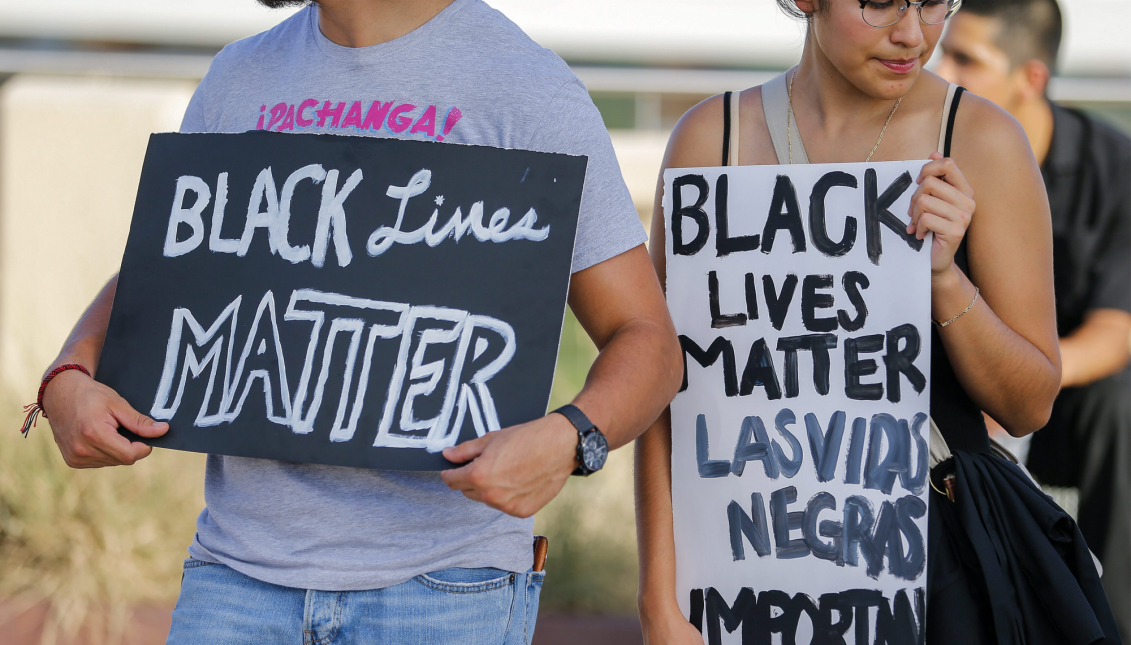
Immigration reform is not just a Latino issue
The conversation surrounding social justice can no longer be framed as black, white or brown. That was the message from activists who gathered on day three of the Democratic National Convention to talk about the militarization of police and how to better unify otherwise disparate communities.
“The police most certainly pit black and brown communities against each other,” says Carmen Perez, co-founder of Justice League NYC and executive director of the Gathering for Justice.
The conversation surrounding social justice can no longer be framed as black, white or brown. That was the message from activists who gathered on day three of the Democratic National Convention to talk about the militarization of police and how to better unify otherwise disparate communities.
“The police most certainly pit black and brown communities against each other,” says Carmen Perez, co-founder of Justice League NYC and executive director of the Gathering for Justice.
“But we need to create entry points, like understanding that Black Lives Matter is about the liberation of black people and once black people are free, we, as Latinos, are also going to be free.”
Wednesday’s call to action came just hours after news trickled in that three of the police officers charged in the 2015 killing of Freddie Gray in Baltimore were acquitted. The 25-year-old Gray suffered fatal spinal cord injuries while in the back of a police van. He died a week later.
The latest acquittal of police in the killing of an unarmed black man adds to mounting tensions that have been brewing in the years since Trayvon Martin was killed in 2012. Although he was shot by a civilian, the acquittal of his killer, George Zimmerman, sparked national outrage among citizens who felt black communities were being unfairly targeted by violence and injustice.
The Black Lives Matter movement sprang up from these frustrations, and has gained more traction in the public eye as black men continue to be disproportionately killed by police. But an opportunity to address the bigger question of equality is being missed by those who see that particular fight for justice as a black and white issue.
“It’s not mutually exclusive,” Perez says. “This is our chance to build collective power.”
Earlier this week, UndocuBlack activist Jonathan Jayes-Green said his status as an undocumented black immigrant shocks many people who are surprised to learn that detentions and deportations are not only a Latino problem. Of course, Jayes-Green is both black and Latino, having been born to an Afro-Caribbean family in Panama.
“If we aren’t combining intersectionality and immigration, we aren’t going to win,” he says. “Black immigrants are detained and deported at five times the rate of their presence within the undocumented community.”
Jayes-Green said he was “distraught” when immigrant rights groups in Maryland, where he currently works and lives, didn’t stand by the black community after Gray was killed.
“They were making comments about black people I expected from white people,” he told a panel Monday at Rock The Vote’s Truth to Power pop-up exhibit and political forum.
He founded UndocuBlack in order to “blackify” the undocumented immigration reform movement, but a deep divide remains.
“It’s a question about what’s being done by Latinos to recognize black folks in their ranks,” says Black Lives Matter founder Alicia Garza. “It’s not unheard of to me that we’re so conditioned to think of immigration reform, in particular, and deportation as being a Latino issue – meaning non-black – but there are half a million black folks living within the United States in the shadows.”
The vast majority of immigrants who applied for protection under President Obama’s Deferred Action for Childhood Arrivals (DACA) were Latino while a tiny fraction were African or Afro-Carribean. For example, approximately 3,100 Jamaicans applied for DACA compared to 443,500 Mexicans, Fusion.com reports. The numbers don’t just reflect the differing demographics, but also that black immigrants might not know about their legal options.
“The immigration reform conversation is also connected to the criminal justice reform conversation that is also connected to gender violence and all these things that are happening,” Perez says.
“Deportation centers are being built and it’s not just Latinos that are being put into these deportation centers and it’s not only black people that are involved in criminal justice system [reform], it’s also Latinos.”
Despite relative calm in the years since, Philadelphia remains segregated with black communities living to the west, northwest and south of City Center and Latinos inhabiting a large swath of North and Northeast Philadelphia.
Once upon a time, tensions between blacks and Latinos flared when a Dominican storeowner, his wife and sister-in-law were killed during a 2011 robbery. Just two years later, communities were outraged when a black police officer struck a Latina during the Puerto Rican Day parade.
More recently, in Los Angeles, Latino gang members were arrested earlier this month for allegedly firebombing the homes of African-American residents living in a predominately Mexican neighborhood. This kind of internal fighting suggests that both communities continue to remain wary, if not suspect, of each other.
“In the same way the Black Lives Matter movement has to do its work to fix what is happening nationally, so does the immigration movement that is being rooted in Latino struggles.”










LEAVE A COMMENT:
Join the discussion! Leave a comment.